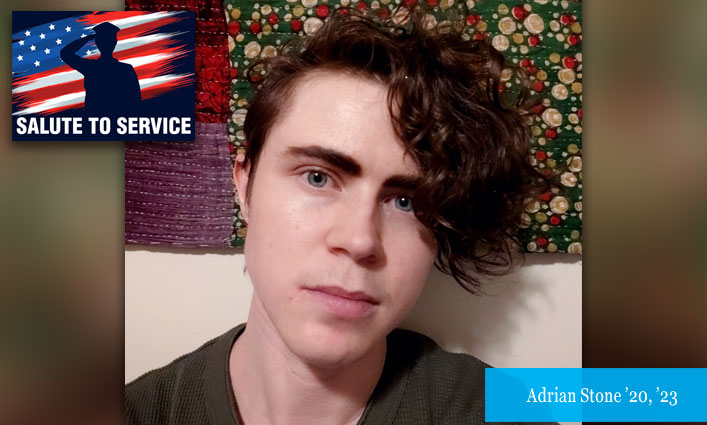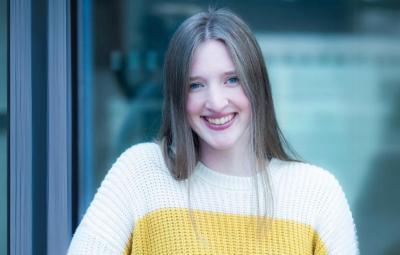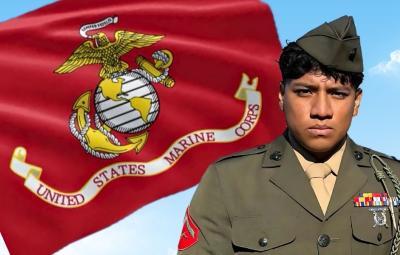
At John Jay College, we’re committed to providing our military service members, veterans, and their families the support they need to reach their academic, professional, and personal goals. These talented students sacrificed a great deal to protect our country and the ideals that we hold dear. We consider it an honor to further their education and create an environment focused on their success. As a continuation of the admirable work done by our Military and Veteran Services Center and Veterans Association, we’re excited to highlight the achievements of our military and veteran community in our “Salute to Service” article series. As you read about their journeys, accomplishments, and aspirations, two things will become abundantly clear: These servicemen and servicewomen are focused on their education—with a 90 percent graduation rate—and they know how to support each other. Whether they’ve served in the United States Air Force, Army, Coast Guard, Marine Corps, or Navy, their unique experiences and perspectives play a vital role in our community.
Communication has always been at the center of U.S. Air Force veteran and graduate student Adrian Stone’s ’20, ’23 life. Growing up with attention deficit hyperactivity disorder (ADHD), Stone, who is pursuing a master’s degree in Forensic Psychology, found it difficult to communicate with others, but he learned that by immersing himself in different cultures and learning new languages, a world of opportunities opened up for him. “Communicating was a struggle for me, so in many ways learning other languages is kind of a proxy for me to better communicate and learn how to think in different ways,” says Stone, who speaks English, Spanish, Japanese, German, Farsi, Dari, and a little bit of Russian. “Learning different languages at school and in the military helped broaden my thinking and made me a better person. I’m more focused on my goals and making sure they come to fruition. I’m more patient with others and I have more empathy.”
Stone’s impressive language skills led to seven years of service with the U.S. Air Force, where as a Cryptologic Language Analyst, he translated and analyzed intelligence communications with the goal of keeping the operation mission on track and keeping airmen safe. Now as the lead Veterans Affairs (VA) work study student in John Jay College’s Military and Veterans Services Center, he’s helping students stay on the path to academic and personal success. “I really embrace the U.S. Air Force’s motto—‘Integrity first, service before self, and excellence in all we do’—and I try to live by that code every day,” says Stone. “My goal is to one day become a psychologist and help others, especially those who have been preyed upon by others, whether it be society or people in power. I want to help them overcome their challenges so that they feel empowered and see that they can take care of themselves.” We sat down with Stone to learn more about his time with the U.S. Air Force and how being multilingual has improved his life.
“Learning different languages at school and in the military helped broaden my thinking and made me a better person.” —Adrian stone
Who or what inspired you to embark on a career in the U.S. military?
It was really a combination of factors that led to my joining the U.S. Air Force. In 2010, the country was going through a recession and finding employment at the time was incredibly difficult. I was essentially trying to live off of my financial aid from the college I was attending at the time, and it just wasn’t enough. My parents were also facing financial difficulty, so we weren’t in the best shape. That’s when I started thinking about getting into the military. I knew it would provide me with stability and would give me all the resources and support I was lacking at the time.
What was it about the Air Force that drew you to that branch of the military?
Joining the Air Force, I felt that I would be more comfortable in an environment where I could use my brain to help complete the missions at hand. When a friend mentioned that there was a Cryptologic Language Analyst career track in the Air Force, and the fact that I already spoke several languages, I thought I would be good in the role. So, I went through the enlistment process, took the language exam, and joined.
Can you tell us what languages you speak and how you came to learn these languages?
I grew up in northern California which has a large Latinx population, so it seemed only natural for me to learn Spanish—I took it for two years in high school—and it was helpful because I could practice speaking the language outside of school. When I first enrolled in college out west, they didn’t offer Spanish-language courses, but they did have Japanese-language courses. I had been interested in Japanese history and culture, so learning the language let me really embrace their culture. After that, I took German-language courses for a few years and, after serving in the military and moving to New York, I took a Russian-language course. It was then I realized that I was really good at learning new languages, and it was something I really enjoyed doing. In the military I learned Farsi and became fluent in that. I’m also fluent in Dari, which is a dialect of Farsi.
I like the challenge of learning a new language. Learning the cultural aspects of a language, and inviting myself into a mindset that is very different from my own, has allowed me to be more flexible with my understanding of things. It’s made me more empathetic and has changed how I perceive others and what they’re feeling. If you look at language, English is a very low context language meaning that its very literal, whereas high context languages like Farsi are not literal—they’re poetic and artistic.
“Inviting myself into a mindset that is very different from my own has allowed me to be more flexible with my understanding of things.” —Adrian Stone
When you were on active duty, what did a typical day look like for you?
I worked mostly at night, doing 12-hour shifts, where I transcribed, translated, and analyzed communications and generated reports for officials. At times it was stressful because you want to make sure that all the information you’re translating is correct. We’re dealing with very big situations that can at times mean life or death for someone, so it was really important to be as accurate as possible.
Can you describe your best day in the U.S. Air Force?
There are two days that really stand out to me. The first is the day I got my promotion test results and learned that I was promoted to Staff Sergeant. I remember thinking my supervisor was pulling a prank on me because it was April Fool’s Day and in the past, I hadn't made the cut-off. I was really proud of myself because I put in the effort, read the book, focused on studying, and made passing the exam my goal.
The second day that stands out to me was when I was in a supervisory position and I was able to help someone who was being maligned and treated poorly because of something that was out of their control. In the past, I had similar experiences with supervisors and with bullies growing up, so I wasn’t about to let someone under my care be treated in the same way. I was advocating for this person in every way I could and thankfully they received no punishment and suffered no repercussions.
What was it about John Jay that drew you to the College?
I’ve always wanted to come John Jay. I’m interested in criminal justice and in psychology, so merging those interests in the Forensic Psychology program at John Jay sounded perfect to me. Add to that the possibility of living New York and it was a no brainer. When I got out of the military, my plan was to come straight to John Jay, but I missed the registration deadline. I ended up taking my gen-ed courses at BMCC [Borough of Manhattan Community College], which also has a great veteran support system in place, and then transferred to John Jay.
“Military and Veteran Services Manager Richard Pusateri has been our community’s greatest advocate and champion.” —Adrian Stone
John Jay College has one of the largest military and veteran communities in all of CUNY, along with a dedicated Military and Veteran Services Center and Veterans Association. How have these organizations impacted your journey at John Jay?
They’ve been very helpful. Military and Veteran Services Manager Richard Pusateri has been our community’s greatest advocate and champion. When I was enrolling in the Forensic Psychology master’s degree program, I was having issues getting into the classes and I started to panic thinking I wouldn’t be able to take classes, which would then mean I wouldn’t get my GI Bill. I sent an email to Richard telling him what was going on with my class schedule. Immediately he got in contact with the individuals who could help, the roadblock was removed, and I was able to enroll in the classes I needed. To know that you have someone who is in your corner that way, someone who will stand up for you, that means a lot to me.
I love being part of the veteran community here at John Jay. When I’m not in class I’m hanging out with veterans in the Veteran Center. I find comfort here. It’s an environment where the people in the room understand you, your experiences, and your mindset. I love helping the community as well. As a work study student in the Veterans Center, I’m helping students by sharing information on jobs, assisting with their presentation preparation, and I’m also tutoring. It’s been great seeing that I’m able to help someone else in my community here at John Jay.
“Whether you’re struggling with class, with your mental health, or with life in general, do not hesitate to ask for help. Someone at the Veterans Center will help you, and if they can’t help you, they’ll find you someone who can.” —Adrian Stone
What advice would you give to other U.S. military servicemen and servicewomen considering going to back to college?
I would tell them to go for it. Once they are in and transition to the role of college student, I would suggest they maintain a sense of structure because they’re coming from an incredibly structured environment. They should create a schedule and make sure they stay on top of assignments, give themselves time to read and study, and of course go to class. But the biggest piece of advice I would offer is to ask for help. Whether you’re struggling with class, with your mental health, or with life in general, do not hesitate to ask for help. Someone at the Veterans Center will help you, and if they can’t help you, they’ll find you someone who can.



